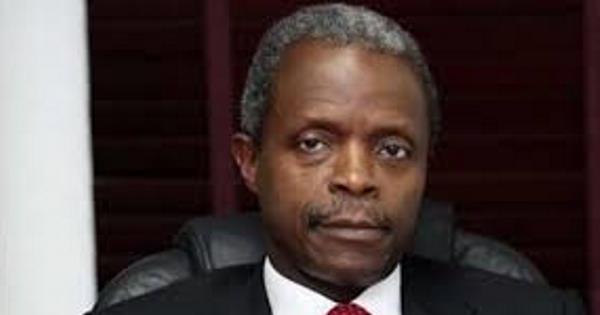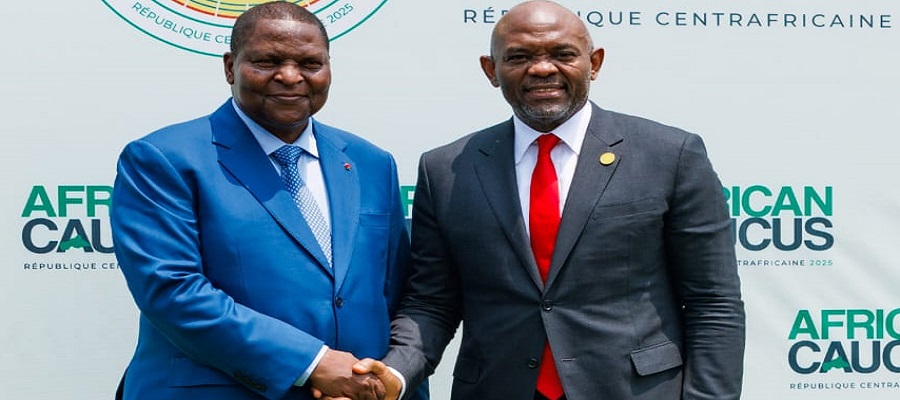General News
FG says 4m MSMEs Benefited from N150bn Funding

More than four million Micro, Small and Medium Enterprises have benefitted from various schemes of the Federal Government, amounting N150 billion, targeted at uplifting the sub-sector in the country.

Mr. Laolu Akande, Senior Special Assistant to the Vice President on Media and Publicity, in a statement, said beyond providing interest-free microcredit loans to petty traders, the various social intervention schemes of the Buhari administration have made significant impact in the lives of millions of ordinary Nigerians.
He quoted Professor Osinbajo, as saying: “This is a shining case study of what President Muhammadu Buhari strongly believes: that Nigerians will solve Nigeria’s problems. This is an example of what we can achieve when we unleash the best of our people – especially our young – on the toughest of our challenges, and give them the free-hand to deliver results.”
Osinbajo spoke at the launch of a Bank of Industry Business Growth Platform.
The BOI Growth Platform includes interventions schemes such as the renowned Government Enterprise and Empowerment Programme (GEEP) loans (MarketMoni, FarmerMoni and TraderMoni) – regarded as Africa’s largest fully-digitized micro-credit scheme, the MSME Survival Fund under the Economic Sustanaibility Plan (ESP), the North-East Rehabilitation Fund, the recently launched World Bank $750million NG-CARES programme, and state-based interventions, among others.
He said: “This demographic was far too important to ignore. We had to start solving for them, especially having been left far behind historically,” a reason he noted led to the implementation of intervention schemes through the BOI’s Growth Platform for MSMEs.
“What might also not be obvious is the sheer scale of impact that has been achieved with these programmes, as over four million Micro, Small and Medium Enterprises have been direct beneficiaries of the over N150billion deployed in the past five years.
“57 percent of these MSMEs are owned by Nigerians below 35 years of age, and close to 60 percent of the beneficiaries are women. What is even less glaring is that the team of Nigerian professionals behind this work is largely young, with an average age of 28 years old.”
Highlighting the transparency and impact of these microcredit schemes, particularly the Government Enterprise and Empowerment Programme (GEEP loans – MarketMoni, FarmerMoni and TraderMoni) under the SIPs, Prof. Osinbajo recalled his interaction in 2018 with a petty trader, Jafar Abubakar, one of the Tradermoni beneficiaries at Abubakar Gumi Market in Kaduna when he visited to launch the scheme in the State.
He narrated: “Jafar Abubakar, who trades in ginger and garlic was one of 5,000 or so traders who had just received N10,000 to advance his business in that market. What struck me was what he said about how he was selected to get the credit.
“He said ‘I just applied. I didn’t know anybody. They came here and captured my data last week and I got the alert yesterday.’”
The VP added that Jafar then “showed me the alert on his phone. Stories like Jafar’s have become all too familiar to me over these years. It is a consistent tune I hear as I engage thousands of beneficiaries of our intervention programmes.”
Indeed, the TraderMoni scheme, which provides N10,000 interest-free & collateral free loans to petty traders, mostly with an inventory of less than N5,000, had made huge positive impact nationwide. This includes enhancing the small businesses of beneficiaries, improving their families and contributing to the informal economy.
“This is perhaps for me one of the most satisfying things about the way our social intervention schemes are deployed. That there is a platform that can process applications from potential beneficiaries, pay out credits or other benefits, maintain auditable records seamlessly. It is those people and infrastructure that make this happen that we are celebrating today,” Prof. Osinbajo noted.
Osinbajo further highlighted the nationwide impact of the Administration’s Social Investment Programmes, which he noted was the “most ambitious social intervention project in Nigeria’s recent history, with a series of people-centric programmes.”
“This is a journey that only began as an idea six years ago: that we can build systems that will serve everybody fairly and justly and bring credibility to government programmes. One of the biggest barriers we identified was the ability to reach people directly, capture and digitize their information (even if they are illiterate) and process a benefit to them directly in a way that is transparent to all. Our vision set out to solve this.
“For some programmes, the everyday Nigerians were young graduates who would benefit from a direct stipend and employment placement from the government. For others, it would be pupils for whom a reliable meal per day would make the difference between staying enrolled in school or skipping school to earn money for that meal.”
Prof. Osinbajo also praised the infrastructure and transparency behind the BOI Growth Platform schemes. For instance, he recalled his visit to the Growth Platform’s Command Centre, which now has “22,000 agents, living across all LGAs in Nigeria and equipped with its proprietary mobile technologies, receive mandates to capture and digitize businesses eligible for its growing suite of programmes.
“Every detail of each business is trackable centrally at the Bank of Industry, down to biodata, geolocation, images and facial IDs of every micro, small and medium entrepreneur where applicable. This has greatly simplified the profiling and decision-making processes that have allowed for direct outreach and impact on Nigerian MSMEs at tremendous scale. And this is being done with entirely home-grown solutions and an ecosystem of institutions, donor partners, service providers and technology companies in Nigeria.”
The Vice President also commended the Managing Director of the Bank of Industry, Mr. Olukayode Pitan; as well as the BOI Growth Platform team led by its Executive Director, BOI, Toyin Adeniji; with Uzoma Nwagba as its Chief Operating Officer.
According to the VP, “they have brought to bear the best of experience and bold thinking, the depths of innovation and youth, and a detailed understanding of the Nigerian spirit, to build an operation and impact that have become a national pride. The over four million micro, small and medium enterprises impacted till date, and the several more to come, are a direct testament to their hard work.”
Adeniji and Nwagba are the co-authors of the “Aid for Productivity” report, which they formally presented at the launch.
The VP also applauded pioneering partners, particularly the Bill and Melinda Gates Foundation for providing the much-needed early support to the Bank of Industry to build this operation to the large scale it is now.
In his remarks, the BOI Managing Director, Mr. Olukayode Pitan, restated the impact of its programmes, noting how programmes such as GEEP have won several local and international awards, including the award at the 2019 African Bankers’ Awards as the most impactful Financial Inclusion program in Africa.
The event also featured closing remarks by representatives of BOI partners: including Mr. Ahmed Rostom, Senior Financial Sector Specialist, World Bank; and the country director, Bill and Melinda Gates foundation, Dr Jeremie Zoungrana.
Prof. Osinbajo also commended the commitment of Nigerian financial institutions, technology companies, service providers and programme partners who he said “have given the best of their expertise to this work over the years.”
General News
Bank Staff Arraigned for Allegedly Defrauding Customer of N423m

Abiodun Maccarthy, former bank employee, has been arraigned before Justice Mojisola Dada of the Special Offences Court sitting in Ikeja, Lagos, over an alleged ₦423 million fraud involving a customer’s fixed deposit investment.

Maccarthy was brought before the court by the Economic and Financial Crimes Commission (EFCC) on Thursday, July 31, 2025.
He faces a four-count charge bordering on stealing and forgery, offences said to be in violation of Sections 278 and 361(1) of the Criminal Law of Lagos State, 2011.
According to a statement by Dele Oyewale, spokesperson, EFCC, the defendant allegedly converted ₦423 million out of a ₦650 million deposit made in 2018 by a client, Great Endurance Bureau De Change, for a fixed deposit investment.
The funds were reportedly diverted for his personal use while he was still in the bank’s employ.
To conceal the alleged fraud, Maccarthy was said to have forged a fixed deposit investment certificate bearing slip number 332540, which he issued to the client as proof of the transaction.
One of the counts reads: “Abiodun Maccarthy, sometime in 2018 at Lagos, within the jurisdiction of this Honourable Court, dishonestly converted to your own use the sum of ₦423,000,000.00 (Four Hundred and Twenty-Three Million Naira), money which forms part of ₦650,000,000.00 (Six Hundred and Fifty Million Naira) paid to you by Great Endurance Bureau De Change for fixed deposit investment while you were in the bank’s employ.”
Another count adds that he “with intent to defraud, forged a fixed deposit investment certificate with slip no. 332540 and issued same to Great Endurance Bureau De Change as evidence of investment.”
Maccarthy pleaded not guilty to all the charges.
Following his plea, B. M. Isah, prosecution counsel requested a trial date and urged the court to remand the defendant in a Correctional Centre.
Justice Dada granted the request and adjourned the case until October 22, 2025, while ordering that Maccarthy be remanded in custody.
General News
Tony Elumelu Lists 3 Things Africa must do to Bridge Infrastructure Gap

Tony Elumelu, group chairman of Heirs Holdings and UBA, has listed strengthening fiscal capacity, driving operational efficiency, and unlocking innovative financing as three key things Africa must do to truly rise and bridge its infrastructure gap.

L-r: Faustin-Archange Touadéra, president, Central African Republic; and Mr. Tony Elumelu, group chair, UBA and Heirs Holdings and Founder, Tony Elumelu Foundation.
Elumelu, also founder of The Tony Elumelu Foundation, urged Africa to enable the private sector to co-lead infrastructure development.
He stated all these in his keynote address at the African Caucus meeting held in Bangui, Central African Republic.
The meeting was themed, ‘Resilient Infrastructure, Human Capital, and Green Assets’.
Elumelu highlighted that across Africa, there is a deep and persistent infrastructure divide.
“From roads to ports, power to internet connectivity, we lag behind. We cannot achieve prosperity without the foundations of modern development. Without addressing these gaps, we cannot unlock the growth and prosperity our people deserve,” he said.
He emphasised that energy access is the most critical enabler or barrier to Africa’s progress, pointing out that up to 70% of Africans still lack access to electricity.
“My home country, Nigeria, generates less than 7,000 megawatts for over 200 million people.
“If we are to industrialise, create jobs, and participate meaningfully in the global AI revolution, we must invest aggressively in energy from renewables to cleaner gas-based solutions. Imagine what Nigeria’s economy could become with 100,000 megawatts of reliable, affordable energy. That is the scale of transformation we need”, he said.
Elumelu called for a stronger role for the private sector in infrastructure delivery, citing the work of Transcorp and Heirs Energies as an example of how private capital can address public challenges.
“We are generating power, exporting it through the West African Power Pool, and using gas from our oil operations to power our plants. This is Africapitalism in action,” he said.
Africapitalism, he explained, is the belief that Africa’s private sector must lead in driving economic transformation through long-term investments that generate both economic and social returns.
But for Africapitalism to succeed, he said, strong public-private partnerships are essential.
“Governments must create the right environment. The private sector must bring capital and innovation. And our development partners must support Africa’s realities – including recognising gas as a viable transition fuel on our path to clean energy”, he added.
On Africa’s human capital, Elumelu underscored that no resource is more valuable than the continent’s people especially its youth.
“Africa is the youngest continent on earth, with over 60% of our population under 35. This presents both our greatest asset or our greatest risk,” he said. “If empowered, our youth can transform Africa. If neglected, they can become a source of instability.”
Through the Tony Elumelu Foundation, he said, over 24,000 young entrepreneurs across all 54 African countries have been empowered with non-refundable seed capital of USD5,000 each.
The foundation has also trained 1.5 million youths and catalysed 1.2 million jobs. “These entrepreneurs are creating jobs, building businesses, and changing lives,” he noted.
To conclude his address, Elumelu delivered three powerful messages.
“Africa’s development is our responsibility. No one else will do it for us. Africa’s future is in our hands. No one will build this continent for us. We must lead,” he said. “Power is everything. No industrial revolution can happen without electricity. We must prioritise energy. Without power, there can be no progress.”
And finally, “We must invest in our youth. They are not just our future, they are our present.”
He commended the growing focus of global institutions on Africa, referencing his role on the IMF Advisory Council on Entrepreneurship and Growth and expressing optimism about the renewed emphasis on job creation as a path to sustainable development.
He also praised the World Bank’s ‘Mission 300’ initiative led by President Ajay Banga, which aims to connect 300 million Africans to electricity
“Africa is ready,” Elumelu declared. “Let’s seize this moment and build the prosperous, empowered continent our people deserve”.
General News
Babcock VC Unveils New Horizons’ N1.5Bn ICT Centre

Prof. Ademola Tayo, the Vice Chancellor, Babcock University, has unveiled a 2,000-seater capacity ICT Centre, built and equipped with modern ICT facilities by New Horizons, a foremost ICT Training Institute.

The three-storey building has six classrooms in each floor that can accommodate a minimum of 50 students in a class, including seat-outs, offices and halls that are fully equipped with flat-screen computers and modern ICT facilities that cut across Artificial Intelligence (AI), Robotics, Internet of Things (IoTs), among others.
Speaking at the unveiling, which marks part of the university’s 23rd convocation activities, the Vice Chancellor thanked New Horizons for the donation of the facility to the university community, which he said, would boost learning of new ICT skills, including AI.
“The university has been in collaboration with New Horizons for the training of our students in ICT certification courses. The reason why our students are doing very well in their studies is because of the digital literacy skills that New Horizon is offering our students. Every student from level-one takes ICT certification courses offered by New Horizon and that has helped the students to excel in their studies,” the Vice Chancellor said.
Mr. Tim Akano, CEO, New Horizons Nigeria, said: “We are not unveiling the building alone. We are also unveiling the resources inside the building. We brought in customized all-in-one systems, including some equipment for Robotics and AI. We also made provision for a garden and we are dedicating the garden to the five principal officers of the university. Each of them will plant a symbolic lemon tree that signifies health, prosperity, fidelity, cleansing, longevity, protection and love.”

 Telecom2 days ago
Telecom2 days agoMTN Mulls AI Tech to Protect Infrastructure as Cable Cuts Hit 13,000 in 18 Months

 E-Financial2 days ago
E-Financial2 days agoBanks Reopen Naira Card Payments for International Tuition Fees

 News2 days ago
News2 days agoYahoo Mail Halts Free Storage Service, Caps at 20GB

 E-Financial2 days ago
E-Financial2 days agoSafaricom, PayPal Collaborate to Link Mobile Money with Online Payments

 E-Business2 days ago
E-Business2 days agoAttackers Target Employees with Fake HR Updates

 Broadcasting2 days ago
Broadcasting2 days agoHow AI Agents Will Revolutionise Industries, Boost Productivity, and Cut Costs

 E-Financial1 day ago
E-Financial1 day agoEcobank Sends Important Notice for Customers

 News2 days ago
News2 days agoCAC to Delist 100,000 Dormant Firms After 90-Day Compliance Window


























